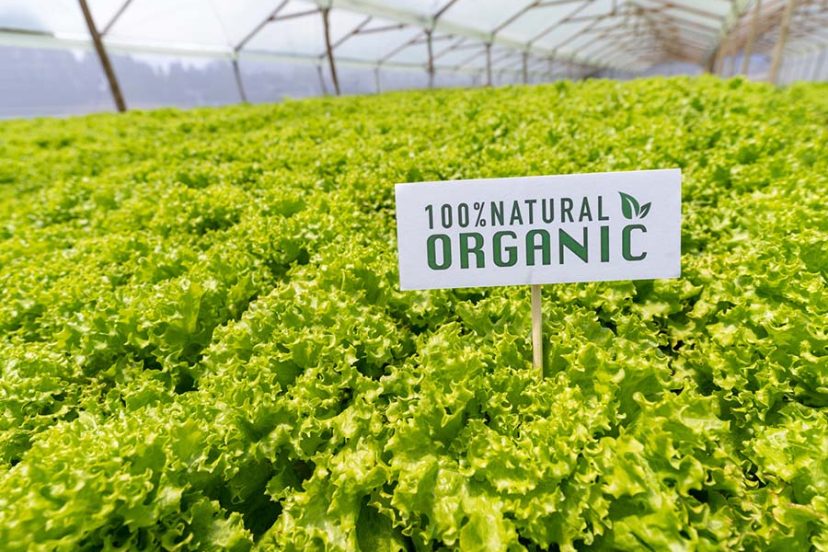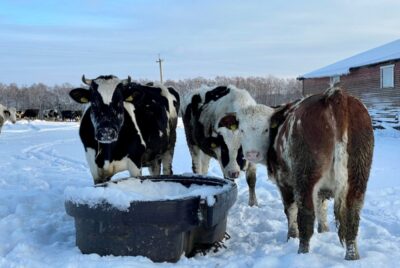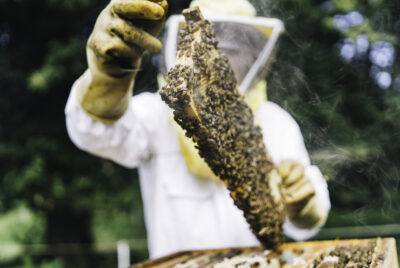What are Holistic Homesteaders?
"We may earn a commission from purchases made using our links. Please see disclaimer."
Holistic homesteaders are individuals or families who combine the principles of self-sufficiency and sustainability in their day-to-day lives. Not only do they aim for independence from mainstream consumerism, but they also ensure their practices are environmentally friendly and enhance their overall well-being. Holistic homesteading is more than a trend; it’s a return to our roots, a rediscovery of age-old skills, and a revolutionary step towards a sustainable future.
The Homesteading Movement
A Brief History

Long before the buzzwords of “organic,” “sustainable,” and “eco-friendly” started trending, homesteading was a way of life. Our ancestors were natural homesteaders, living off the land, rearing their livestock, and tending their vegetable gardens. This lifestyle was necessary for survival, allowing them to provide for themselves and their families without relying heavily on external sources.
The Modern Homesteader
Fast forward to the present, the face of homesteading has drastically changed, but the essence remains. Today’s modern homesteaders are people who strive to live a more self-sufficient, sustainable life, often in contrast to the mainstream consumerist society. They reject the culture of mass production and disposable consumption, choosing instead to create, grow, and maintain things for themselves.
Seeking independence from consumerism, modern homesteaders build self-reliant lives of purposeful work aligned with nature. Connecting with the land, they foster community resilience and regenerative living systems.
Their ethos challenges convenience-driven lifestyles harmful to our planet. Homesteading reawakens ancestral skills for a sustainable future. It empowers people to live deeply rooted, values-aligned lives.
Defining Holistic Homesteading
What Makes Homesteading Holistic?
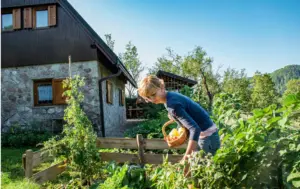 Holistic homesteading takes traditional homesteading a step further. It doesn’t just focus on self-sufficiency; instead, it intertwines this lifestyle with a conscious, sustainable approach that respects the environment and promotes overall wellness. Holistic homesteaders understand that every decision they make impacts their health, their environment, and the overall balance of their lives.
Holistic homesteading takes traditional homesteading a step further. It doesn’t just focus on self-sufficiency; instead, it intertwines this lifestyle with a conscious, sustainable approach that respects the environment and promotes overall wellness. Holistic homesteaders understand that every decision they make impacts their health, their environment, and the overall balance of their lives.
Integrating ecology, ethics, and well-being, holistic homesteading sees life’s big picture. It aligns living with nature’s rhythms for mutual flourishing. This system’s perspective guides daily choices toward wholeness and harmony.
Holistic homesteading nurtures personal, social, and ecological balance through mindful, regenerative living. It cultivates holism and natural harmony in all aspects of daily life.
The Pillars of Holistic Homesteading
Holistic homesteading rests on several pillars – the desire to be more self-sufficient, the will to live sustainably, respect for nature, and a commitment to health and wellness. This approach considers the bigger picture, recognizing the interconnectedness of all things. It’s about nurturing the body, mind, and spirit, as well as the land one lives on.
The core pillars of holistic homesteading integrate self-reliance, eco-consciousness, natural harmony, and whole-life wellbeing into a holistic lifestyle. Together they uplift human potential within balanced natural systems for mutual thriving. These values cultivate wholeness through purposeful work, mind-body health, and community bonds. They reinforce each other in an ecology of well-being.
Benefits of Holistic Homesteading
Sustainability and Self-Sufficiency
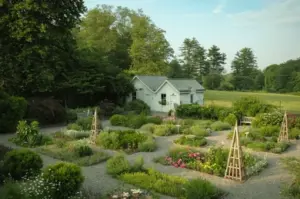 Holistic homesteading is about living in harmony with nature, producing as much as possible on your own, and reducing waste. This self-sufficient, eco-friendly lifestyle minimizes one’s ecological footprint and contributes to the well-being of our planet. By harnessing renewable resources and applying sustainable practices, holistic homesteaders ensure a balanced give-and-take relationship with nature.
Holistic homesteading is about living in harmony with nature, producing as much as possible on your own, and reducing waste. This self-sufficient, eco-friendly lifestyle minimizes one’s ecological footprint and contributes to the well-being of our planet. By harnessing renewable resources and applying sustainable practices, holistic homesteaders ensure a balanced give-and-take relationship with nature.
Living lightly on the earth, holistic homesteading nourishes natural ecosystems while meeting basic needs through renewable self-provision. It fosters ecological balance through circular resource flows and regenerative practices aligned with nature. Self-reliance and deep ecology reinforce each other in the holistic homestead. It integrates social, ecological and economic sustainability.
Health and Wellness
Holistic homesteading is about wellness – both physical and mental. By growing their own organic food, homesteaders ensure a fresh, pesticide-free diet. Physical activity in the garden and the satisfaction derived from producing your own necessities contribute to mental health. This way, the homesteading lifestyle supports a balanced, healthier living. A major study documents the benefits of organic farming which was published in the British Journal of Nutrition and was co-author by Charles Benbrook, a Washington State University researcher.
The holistic homesteading lifestyle promotes fitness and nourishment by linking labor, nature, and nutrition into an integrated cycle of health. It cultivates inner and outer vitality through purposeful outdoor work, wholesome food, and community bonds.
Daily practices strengthen self-healing abilities through alignment with natural rhythms. Holistic homesteading develops robust health through whole-system alignment.
Community and Connection
 Holistic homesteading isn’t a solitary journey. It’s about building strong relationships with like-minded individuals, engaging in local communities, and nurturing a sense of shared responsibility. The holistic approach fosters a deep connection with nature, helping us to understand and appreciate the natural cycles and rhythms of the Earth.
Holistic homesteading isn’t a solitary journey. It’s about building strong relationships with like-minded individuals, engaging in local communities, and nurturing a sense of shared responsibility. The holistic approach fosters a deep connection with nature, helping us to understand and appreciate the natural cycles and rhythms of the Earth.
Cultivating communal bonds and ecological awareness, holistic homesteading weaves people and nature into a strong web of mutual flourishing. It builds collective knowledge, solidarity, and grassroots resilience grounded in natural wisdom. Shared learning reinforces values of stewardship and social responsibility. Together we can cultivate abundance through cooperation, compassion, and skill sharing.
Getting Started with Holistic Homesteading
Setting Your Homesteading Goals
Embarking on the journey to holistic homesteading doesn’t have to be overwhelming. Start by setting clear, achievable goals. Whether it’s growing your own vegetables, raising chickens for eggs, starting a composting system, or setting up a rainwater harvesting system, the important thing is to take the first step. Every small success will motivate you to take the next.
Begin your homestead by identifying realistic, incremental goals to build confidence, skills, and momentum over time. Let your interests guide you as you expand your practical abilities and ecological understanding. Nature reconnects us through small daily actions that empower regenerative living. Have patience with yourself as you learn – it’s a lifelong journey.
Essential Skills for Holistic Homesteaders
 Holistic homesteading is a skill-based lifestyle, but don’t let that intimidate you. These skills can be learned over time, often through hands-on experience. Key abilities include organic gardening, animal husbandry, preserving and canning food, basic carpentry, and understanding natural ecosystems. Each new skill you acquire is another step towards self-reliance.
Holistic homesteading is a skill-based lifestyle, but don’t let that intimidate you. These skills can be learned over time, often through hands-on experience. Key abilities include organic gardening, animal husbandry, preserving and canning food, basic carpentry, and understanding natural ecosystems. Each new skill you acquire is another step towards self-reliance.
Core competencies like gardening, livestock care, food preservation, DIY, and ecological literacy are cornerstones of the self-sufficient homesteading life. Step-by-step you can gain ancestral skills linking you to nature’s abundance.
Community mentors accelerate learning core homesteading abilities holistically. Skills build confidence, resilience, and self-reliance over a lifetime.
Holistic Homesteading Challenges
Common Challenges and Solutions
Just like any other lifestyle, holistic homesteading comes with its own set of challenges. You might struggle with pests in your garden, diseases in your livestock, or tough weather conditions. Yet, these hurdles are opportunities to learn and adapt. Successful homesteading depends on resilience, creativity, and a willingness to learn from both success and failure.
Obstacles like pests, illness, and weather build homesteading resilience, spurring creative solutions, and a growth mindset. With nature’s feedback, holistic homesteaders cultivate flexibility, innovation, and deeper ecological attunement. Challenges strengthen self-reliance, ingenuity, and systems thinking step-by-step. Each difficulty makes us more adaptive, compassionate, and whole.
Inspiring Examples of Holistic Homesteaders
Case Studies

Countless individuals and families around the globe have embraced the holistic homesteading lifestyle. Their experiences range from thriving urban gardens in small city apartments to sprawling rural homesteads powered by renewable energy. Each story is unique, but they all share a commitment to sustainability, self-sufficiency, and holistic wellness. These real-life experiences serve as an inspiration and testament to the power and potential of holistic homesteading.
Uplifting examples of urban and rural homesteads model how holistic principles can be applied in diverse settings and situations. They encourage us all to align our lives with nature, community, and purposeful work.
Everyday homesteaders cultivate health, ecology, and purpose anywhere. Their stories kindle our imagination to create regenerative lives.
Conclusion: The Holistic Homesteading Journey
Holistic homesteading is more than just a lifestyle. It’s a journey of discovery and transformation that reconnects us with nature, empowers us to take charge of our lives, and promotes a sustainable and healthier future. While it may seem daunting at first, every step you take brings you closer to self-reliance, environmental stewardship, and a balanced way of living.
Embracing holistic homesteading leads to personal growth, ecological harmony, and a more purposeful, meaningful life aligned with nature. Step by step we can build regenerative lives of deep connection, vitality, and resilience.
Small actions today create ripples of positive change for our future. We all have a role to play in co-creating a sustainable world.
So, are you ready to start your holistic homesteading journey?
FAQs – Frequently Asked Questions
What is the first step to becoming a holistic homesteader?
Start with small, manageable steps. You might begin by growing a few herbs in your kitchen, learning to compost, or reducing your household waste. Education is also key. Read books, attend workshops, and learn from established homesteaders to broaden your knowledge.
Can I practice holistic homesteading in the city?
Absolutely! Urban homesteading is a growing movement. Even with limited space, you can grow herbs and vegetables in containers, set up a small compost bin, or keep a few chickens for eggs. It’s about applying sustainable, self-sufficient principles in the context of your own living situation.
What skills do I need to be a holistic homesteader?
Holistic homesteading requires a range of skills, but you don’t need to master them all at once. Some key abilities include organic gardening, animal care, food preservation, and basic DIY skills. As your homestead grows, so will your skillset. Remember, the journey of homesteading is a constant learning process.
How does holistic homesteading contribute to sustainability?
Holistic homesteading contributes to sustainability in many ways. By reducing dependence on commercially produced goods, creating less waste, and growing organic, locally-sourced food, you’re reducing your ecological footprint. In addition, practices like composting and water conservation contribute to a more sustainable lifestyle.
Can holistic homesteading save me money?
Yes, in the long run, holistic homesteading can lead to significant savings. Growing your own food, preserving it, reusing materials, and reducing waste all help to cut costs. While there may be initial investments for certain projects (like setting up a garden or buying chickens), the recurring savings over time can be substantial.


